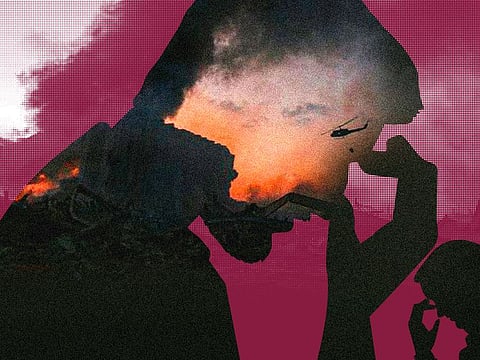Justice at Risk: Perilous path of Lebanon’s explosive probe
Journey to uncover truth behind 2020 Beirut blast is a fight against systemic resistance

Last January and after a thirteen-month suspension, Lebanese judge Tarek Bitar resumed his probe into the infamous 2020 massive explosion at the port of Beirut, which tore down half the city, killed 218 people, left another 300,000 homeless, and inflicted collateral damage estimated at no less than $15 billion.
Seven months down the road, very little has come out about his work and findings, due mainly to security concerns regarding his life after he levied criminal charges against eight former officials, including ex-prime minister Hassan Diab, ranging from deliberate negligence to homicide.
Bitar is the second judge to handle the case after his predecessor Fadi Sawan was removed in early 2021, also for trying to question the country’s top politicians.
Both men are convinced that what happened in Beirut on 4 August 2020 was no accident, and that it was caused by major negligence on behalf of port officials and senior members of government from across the political spectrum. It was the result of 2750 tons of ammonium nitrate stored carelessly at the port of Beirut, confiscated from an abandoned ship back in 2014.
Accusations against Diab
Twenty-four hours after the apocalyptic blast, sixteen port officials were placed under house arrest, including its manager and the former director of customs. By 19 August, the number of accused individuals had risen to 25 and by the end of the year 2020, topping the list was Prime Minister Diab, a protégé of then-president Michel Aoun and his son-in-law Gibran Bassil.
Diab was not in power when the explosive material reached the port in 2014, and had only been in-office for eight months when the explosion occurred. Summoning him for interrogation triggered backlash from the Lebanese Sunni community, especially from former prime minister Saad Al Hariri.
Although there was no love between him and Diab, Hariri claimed that charging him with the port explosion was too much. Although he himself was not called to court, one of his associates was targeted by Bitar, being ex-interior minister Nouhad Mashnouk.
Targeting Lebanon’s political elite
But it wasn’t only Hariri whom Bitar had aroused but also, practically everybody within Lebanon’s political elite. Among those summoned to court or charged with negligence and/or homicide are three former Shiite ministers from the Amal Movement, all proteges of Parliament Speaker Nabih Berri, and ex-minister Yusuf Finianos, a protégé of Hezbollah’s presidential candidate Suleiman Frangieh. That makes Bitar’s probe a cross-sectarian one, targeting senior Sunni, Shiite, and Christian politicians.
These parties control the lion’s share of seats in the chamber of deputies, and they made sure to drown any attempt by Bitar at lifting parliamentary immunity to allow persecution of current MPs and former ministers. All have filed legal cases against the fearless judge, resulting in repeated delays and suspending the probe for 13-months. The formal accusation of Amal ministers famously led to the showdown on the streets of Beirut in October 2021, between their allies in Hezbollah and foes in the Lebanese Forces (LF) of Samir Gagegea.
Bitar versus Judge Oweidat
A new element in the probe is Bitar’s recent decision to question Public Persecutor Ghassan Oweidat, whom he believes knew of cracks in the warehouse where the ammonium nitrate was stored, but decided to ignore. Furious at putting him on the list of suspects, Oweidat slapped a travel ban on Bitar in January 2023 and accused him of “rebelling against the judiciary and usurping power.” Oweidat then ordered that all mid-level officials arrested over the probe released immediate “with no exceptions,” especially those put in jail by Tarek Bitar since February 2021.
What’s next?
For the families of the port victims, Tarek Bitar is their last and only hope. If his work is obstructed, then he might move from charges to legal indictment, which means, sending their names to Interpol. In addition to preventing them from travel, that would probably lead to their formal indictment in Germany and France, where a criminal investigation is also underway over the Beirut port explosion, given that several of their own citizens had died in the blast.
Much has happened in Lebanon since he was charged with the case, in terms of economic collapse and security breakdown. Clashes have taken place in the Ayn Al Hilweh refugee camp, which have already spilt into the nearby city of Sidon and might spread far beyond. Last week the country found itself on the verge of civil war — yet again — when armed clashes erupted in the Kahaleh area near Beirut, between Hezbollah and members of the pan-Maronite Lebanese Phalange.
Two people have been killed, one from each party, meaning that revenge killings might ensue, if their relatives decide to take justice into their own hands. The last thing Tarek Bitar needs is an atmosphere of sheer terror that, topped with complete lawlessness and thuggery, could potentially drown any probe, no matter how dedicated or its judges are.
And would anybody be surprised in Lebanon? None of the crimes committed in the past half century have been properly persecuted, and nor has justice been achieved for their victims, the most recent of course, is the 2005 murder of former prime minister Rafik Al Hariri. Despite an international probe, only one man has been indicted, and he remains at large.
— Sami Moubayed is a historian and former Carnegie scholar. He is also author of Under the Black Flag: At the frontier of the New Jihad.



